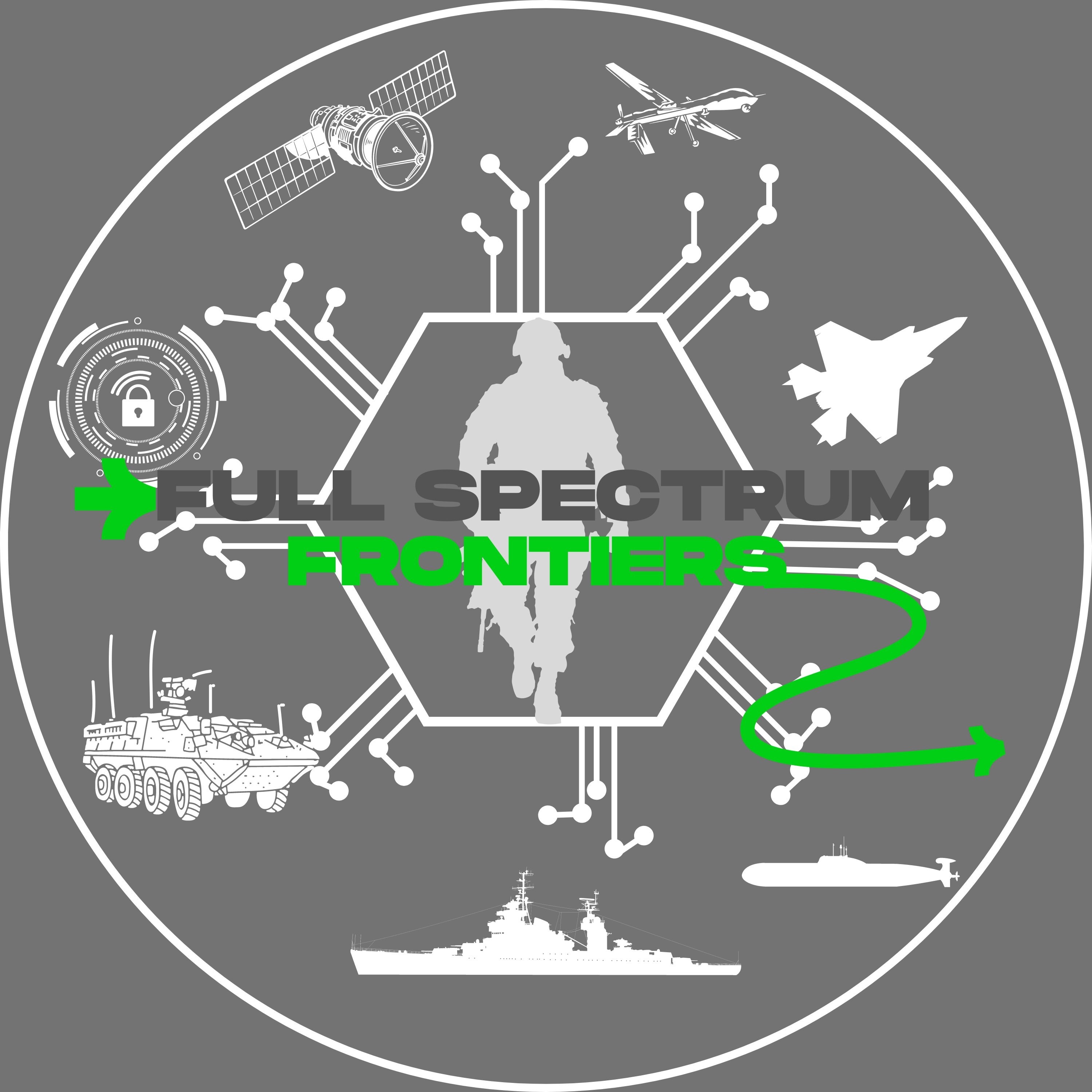The Full Spectrum Frontier’s Podcast

“Full Spectrum Frontiers” is a podcast that delves into the intersection of various significant themes such as manufacturing, the military, the economy, politics, American culture, and life. It explores how these areas are intertwined and how they influence and shape each other. The podcast aims to preserve, maintain, and highlight the essence of these interconnected topics, offering listeners in-depth insights and discussions. It’s a platform where complex and multifaceted issues are unpacked to understand their broader impact on society and individual lives.
Episodes
Episodes



Monday Mar 10, 2025
Eyes in the Sky: How Drones Are Shaping Our Future
Monday Mar 10, 2025
Monday Mar 10, 2025
In this episode of Full Spectrum Frontiers, we’re taking to the skies—digitally, at least—to explore how drones are revolutionizing national security across all aspects of American life. From military operations and law enforcement to farming, land management, and environmental protection, unmanned aircraft systems (UAS) are becoming the silent guardians of our modern world.
At the heart of this transformation is the organization Vets to Drones, a groundbreaking initiative that helps military veterans transition into careers in the drone industry. With their extensive experience in reconnaissance, surveillance, and operating advanced technology in high-stakes environments, veterans are uniquely suited to leading the charge in drone innovation for defense, public safety, and commercial applications.



Monday Mar 03, 2025
The War Before the War
Monday Mar 03, 2025
Monday Mar 03, 2025
War doesn’t start when the first bullet is fired—it starts long before, in the shadows of economic manipulation, cyber attacks, and psychological warfare. In this episode of Full Spectrum Frontiers, we break down the unseen battles already shaping the next global conflict—from the collapse of the U.S. dollar’s dominance to cyber warfare, disinformation campaigns, and military escalations across the world.
We dive deep into:✅ How modern wars are fought before they officially begin✅ The economic war brewing between the U.S. and the BRICS nations✅ How cyber and information warfare are shaping the battlefield✅ Why domestic instability is a key prelude to major conflict✅ How you can prepare for the ripple effects on your life, economy, and future
The future is being shaped right now—the only question is, will you be ready?
🔊 Listen now and stay ahead of the curve.
👉 If this episode made you think, do me a favor—like, share, and review the podcast. That’s how we grow, and that’s how we wake more people up. Stay sharp. Stay ready.
Spotify
https://open.spotify.com/show/0IpcLT182C6UpnTpACL1HL?si=80c55f1f4b2041b0
Apple
https://podcasts.apple.com/us/podcast/the-full-spectrum-frontiers-podcast/id1752521325
YouTube
https://www.youtube.com/@FullSpectrumFrontiers



Monday Feb 24, 2025
Ukraine's War: Financial Burdens and the Quest for Global Stability
Monday Feb 24, 2025
Monday Feb 24, 2025
Ending the war in Ukraine isn’t just about stopping the bloodshed—it’s about preventing a geopolitical disaster that could spiral into something far worse. The longer it drags on, the more entrenched the conflict becomes, draining resources, destabilizing Europe, and pushing the world closer to a broader confrontation between nuclear powers. It’s a war of attrition that benefits no one but arms manufacturers and bureaucrats playing geopolitical chess. Meanwhile, innocent people suffer, economies teeter, and global alliances fracture. The question isn’t whether it’s important to end the war—it’s whether anyone in power actually wants to.
Spotify
https://open.spotify.com/show/0IpcLT182C6UpnTpACL1HL?si=80c55f1f4b2041b0
Apple
https://podcasts.apple.com/us/podcast/the-full-spectrum-frontiers-podcast/id1752521325
YouTube
https://www.youtube.com/@FullSpectrumFrontiers



Monday Feb 10, 2025
The Panama Canal: America’s Strategic Lifeline
Monday Feb 10, 2025
Monday Feb 10, 2025
The Panama Canal is a strategic artery of global commerce and a linchpin of U.S. national security. Control over this chokepoint ensures rapid naval mobility between the Atlantic and Pacific, a critical advantage in both peacetime logistics and wartime operations. Since its completion in 1914, the canal has played a decisive role in American military strategy, allowing for quick force projection and supply chain continuity. Its transfer to Panama in 1999 raised concerns over foreign influence, particularly China's expanding footprint in the region. With global tensions rising and supply chains under strain, securing the canal remains a top-tier national security priority for the United States.



Monday Feb 03, 2025
Crypto, CBDCs, and the Death of Cash – Who Controls the Future of Money?
Monday Feb 03, 2025
Monday Feb 03, 2025
The world is at a crossroads where traditional cash is on life support, digital currencies are rising, and control over money is shifting from individuals to centralized entities. Cryptocurrency promised financial freedom—decentralized, borderless, and beyond government control—but Central Bank Digital Currencies (CBDCs) are the state's answer to that rebellion. With CBDCs, every transaction is monitored, programmable, and subject to political whims. Meanwhile, private banks and corporations push for a cashless society, leaving the average person with fewer options and less autonomy. The question isn’t just about technology; it’s about power. Who decides how you spend, save, and transfer wealth? And what happens when control over money means control over you?
Spotify
https://open.spotify.com/show/0IpcLT182C6UpnTpACL1HL?si=80c55f1f4b2041b0
Apple
https://podcasts.apple.com/us/podcast/the-full-spectrum-frontiers-podcast/id1752521325
YouTube
https://www.youtube.com/@FullSpectrumFrontiers



Monday Jan 27, 2025
Monday Jan 27, 2025
Welcome back to Full Spectrum Frontiers, the podcast where we explore the crossroads of manufacturing, military, politics, and the economy—breaking down the forces shaping our American way of life. Today, we’re joined by a special guest who truly embodies the spirit of resilience and independence in these challenging times.
Tony Arterburn is a combat veteran, entrepreneur, and the founder of Wise Wolf Gold and Silver Exchange. He’s a trusted voice in the world of precious metals, helping individuals secure their financial futures by investing in gold and silver, especially during times of economic uncertainty. Beyond his expertise in economics and precious metals, Tony is also a patriot and a thought leader, offering keen insights into how our nation can preserve liberty and sovereignty amidst global challenges.
Tony's perspective bridges history, economics, and values—making him a perfect guest for today's episode. Get ready for an enlightening conversation about the role of precious metals in economic stability, the shifting tides of geopolitics, and what it means to secure your future in uncertain times. Tony, welcome to Full Spectrum Frontiers. It’s a privilege to have you here.
Wise Wolf Silver and Gold Exchange
America Unplugged
The Arterburn Radio Transmission
Full Spectrum Frontiers Links
Spotify
https://open.spotify.com/show/0IpcLT182C6UpnTpACL1HL?si=80c55f1f4b2041b0
Apple
https://podcasts.apple.com/us/podcast/the-full-spectrum-frontiers-podcast/id1752521325
YouTube
https://www.youtube.com/@FullSpectrumFrontiers



Monday Jan 20, 2025
Wildfire Crisis Uncovered: Root Causes, Solutions, and a Call to Action
Monday Jan 20, 2025
Monday Jan 20, 2025
In this episode of Full Spectrum Frontiers, we’ll dissect the recent wildfire outbreaks, analyzing the core factors driving their intensity and frequency—poor forest management, environmental policy failures, and climate patterns. We’ll explore actionable prevention strategies, from controlled burns and updated zoning laws to advancing technologies like AI-driven fire detection and eco-friendly land clearing. This isn’t just about understanding the problem; it’s about taking a hard look at what needs to change to safeguard lives, property, and ecosystems for the future.
Spotify
https://open.spotify.com/show/0IpcLT182C6UpnTpACL1HL?si=80c55f1f4b2041b0
Apple
https://podcasts.apple.com/us/podcast/the-full-spectrum-frontiers-podcast/id1752521325
YouTube
https://www.youtube.com/@FullSpectrumFrontiers



Monday Jan 13, 2025
EMP Preparedness: Can America Survive the Next Big Blackout?
Monday Jan 13, 2025
Monday Jan 13, 2025
An electromagnetic pulse (EMP) poses a real and underappreciated threat to the United States, capable of crippling our power grid, communications, and critical infrastructure in an instant. Whether triggered by a high-altitude nuclear detonation, a solar storm, or a sophisticated cyberattack, the consequences would be catastrophic—food supply chains halted, emergency services paralyzed, and modern society thrust into chaos. Despite this, our nation remains woefully unprepared, with outdated grid protections and a lack of public awareness. How close are we to the brink? Closer than most are willing to admit.
Spotify
https://open.spotify.com/show/0IpcLT182C6UpnTpACL1HL?si=80c55f1f4b2041b0
Apple
https://podcasts.apple.com/us/podcast/the-full-spectrum-frontiers-podcast/id1752521325
YouTube
https://www.youtube.com/@FullSpectrumFrontiers







